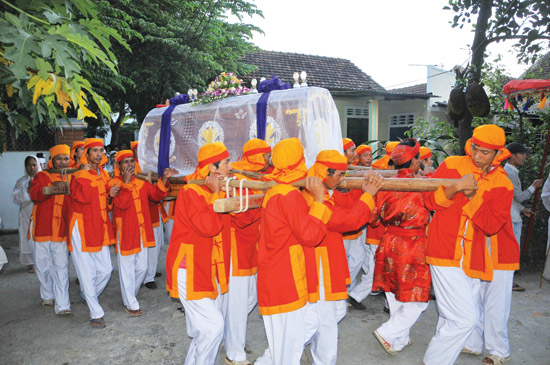(No.7, Vol.3, Aug 2013 Vietnam Heritage Magazine)
A funeral procession in Hue in 2013.
I came to Hue [from Hanoi] for the first time early one summer evening. My mother-in-law, a native of Hue, announced that there would be a funeral in her hometown and that she needed to return home to pay her respects, so, if I wanted to come along, I certainly could.
We would not don the morning gowns until early the next day, but relatives had to come ahead of time. As soon as we got off the plane, we grabbed a taxi and went out silently into the night. The car passed Dap Da and then turned into a small hamlet on an alley in Vi Da Village.
The people of Hue have long lived in the lands of lords and kings. Hence, they are as sophisticated and intricate as noblemen in whatever they do. Although the average income of people in Hue is lower in comparison with that of other cities and despite the fact that the home at which I attended the funeral was just as plebeian as numerous other families’ in the city, the funeral was nevertheless extremely elaborate and protracted.
The first anomaly of funerary customs among the people of Hue is that they leave the coffin in the home for over a week. This is to allow them to wait for busy relatives from afar to return so that the latter are able to offer incense. Government law only permits leaving the body of the deceased person out for 48 hours, but relatives in Hue go ahead and place the coffin in the home for up to 30 days. One of the techniques with which they preserve the body is to pour in sand and clay to tightly cover the inside of the coffin and then add to it various secret family concoctions prepared by undertakers in Hue. Thus, the corpse does not exude odours outside the coffin.
Among the numerous undertakers in the imperial city of Hue, Mr Chau Can occupies nearly the entire market share for funerals. That morning I met Mr Can — a man beyond his 80th birthday and thus empowered to don the long-flowing red silk gown speckled in gold, golden turban, and white trousers. He commands a funerary team of several dozen men who also wear antiquated garb like his but in different colours: blue gown, red cloth cap, and white trousers, the cuffs of which are a dazzling multi-hued red. Mr Can orchestrates the ceremony and the shrouding of the body all the way up to the point when they take the departed high up into the mountains. (Hue people have a custom of burying the deceased high in the mountains).
The coffin is overly ponderous because of the sand stuffed into it, plus the abundant sticks of incense burning on its lids. It takes up to several dozen people to carry it on a single pole. At that time, Mr Can seemed like a musical conductor. He stood at the head of the coffin sedately crying out loud authoritative words in the local dialect, which I could hardly understand. After his calls, the team of family members lifted the pole with such synchronization that not a single stick of incense was disturbed. They then maneuvered left and right in this manner all the way up until they had scaled the mountain.

At a funeral in Hue in 2013. The coffin is to be taken into the grave.
Photos: Canh Tang
The most striking scene in the funerals of Hue people is when they sing while pummelling. After placing the coffin in the ground and covering it with earth, the team of local pole-bearers must grab cudgels and pound the earth firm. They walk in a circle around the grave, holding the cudgel in front of their faces and pummelling the earth as they sing in harmony with the beat of their strikes. The content of their folk singing speaks of the person who had passed away. I could not understand the words clearly, but the tune of the singing was thoroughly upbeat and, listening to it for a while, I memorized the tune and could sing along. The people working with Mr Can were adolescents. They moved rhythmically as they beat and sing. Their faces smiled joyously in the scalding sunlight. It seemed more like a festival procession than a funeral. There was no lugubrious sobbing, dishevelling the head and pulling out hair, or bewailing like people from the North.

